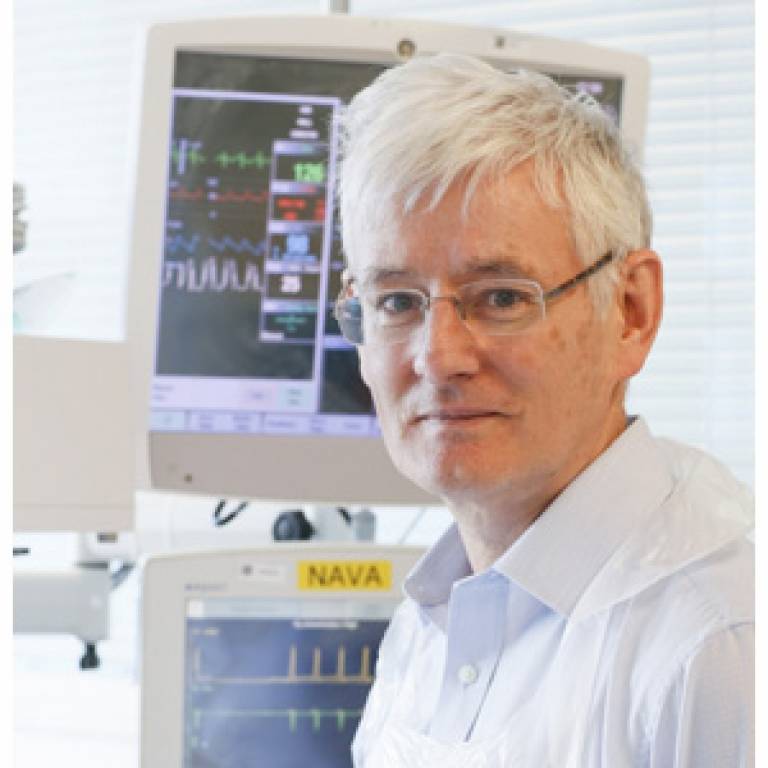Promising new treatment for respiratory syndrome
14 February 2014
A new treatment for patients with acute respiratory distress syndrome has seen mortality rates plummet by about 80 per cent.

The results of a Phase II trial led by Dr Geoff Bellingan (UCL Clinical Physiology and medical director at University College London Hospitals) have been published in The Lancet Respiratory Medicine.
Acute lung injury (ALI) and its more severe form, acute respiratory distress syndrome (ARDS), are major causes of death in intensive care units.
It is estimated that approximately 300-400,000 people suffer from ARDS in Western countries each year and the mortality rate remains high, around 35-45%, despite modern day care.
At the moment there is no effective drug treatment for the syndrome, so patients tend to be treated with mechanical ventilation and optimisation and support of vital functions.
Major causes of ARDS include direct lung injury such as lung infection (pneumonia), aspiration pneumonia or indirect injuries such as severe sepsis, major multiple trauma or pancreatitis.
But a clinical study to test the new drug developed by Faron Pharmaceuticals Limited, demonstrated an astonishing 81% reduction in mortality in ARDS patients, with a mortality of only 8.1% in patients treated with Traumakine, compared to the 32.2% mortality seen in the control group of ARDS patients.
All other measured parameters, including length of mechanical ventilation needed, length of ICU stay and support of vital functions also clearly benefited from the treatment.
Pulmonary vascular leakage occurs early in ALI/ARDS, and mortality remains high. An effective pharmacotherapy is desperately needed and Traumakine has been shown to reduce capillary leak. We were very happy to see this translate into a benefit in ARDS patients as predicted.
Dr Geoff Bellingan (UCL Clinical Physiology)
The trial was conducted in eight intensive care units around the UK and was led by a team of scientists and clinicians which included UCL professor of intensive care medicine Hugh Montgomery and UCL/UCLH intensive care clinical lead David Howell.
The results, together with the molecular studies of Professor Sirpa Jalkanen from Finland's University of Turku, are incorporated in the research article published in The Lancet Respiratory Medicine.
"Pulmonary vascular leakage occurs early in ALI/ARDS, and mortality remains high. An effective pharmacotherapy is desperately needed," said Dr Bellingan.
"Traumakine has been shown to reduce capillary leak and we were very happy to see this translate into a benefit in ARDS patients as predicted. The drug promotes the formation of a local anti-inflammatory molecule and improves the amount of oxygen entering the blood stream from the air," he said.
Patient Martin Carrigan knows the drug saved his life after he developed ARDS. Martin, 46, a painter decorator who lives in Notting Hill, collapsed after a day out without warning.
"I was working nights and had finished a job on the Wednesday so I'd planned a day out shopping on Thursday with my partner Jennifer. We'd just returned home and Jennifer had just remarked that I was looking very pale when, within seconds, I was overtaken by a violent coughing fit, started coughing up, tried to sit on a chair and collapsed.
"That is all I remember. My partner told me afterwards that she called an ambulance and I was at UCH within 25 minutes, lying in an induced coma from which I woke up eight or nine days later.
"All I remember is hallucinating very badly while being in a coma and being very scared of the nightmarish quality of the hallucinations, so much so that the nightmares haunted me for six months afterwards.
"Jennifer told me afterwards that I was in intensive care for three or four days and then five days on a ward. I was very weak for quite a few weeks afterwards and it took me eight or nine weeks before I could go back to work, but I'm very well now.
"This came totally out of the blue. I had no idea anything was wrong with me."
Meanwhile Dr Bellingan, Reader in Intensive Care Medicine at UCL, said he and his team were looking forward to starting further clinical investigations.
Faron has been granted orphan drug status for the treatment of ALI/ARDS with FP-1201-lyo (Traumakine®) by the European Commission and European Medicines Agency (EMA) and is waiting for EMA advice to start phase III studies.
"We are very pleased to receive the FPCLI001 trial results and related information published in this prestigious journal", said Faron's CEO Markku Jalkanen.
"We hope that this publication promotes our efforts to attract active intensive care sites and clinicians to join our next step, the pan-European phase III pivotal trial starting in 2014," said Professor Jalkanen.
In addition to its high rate of mortality, ARDS is also a major economic burden to hospitals and health care budgets.
It is estimated that due to a long ICU and hospital stay, the cost of every saved life from ARDS is approximately £43,000 (US$70,000). With a new efficient pharmacotherapy, hospital stays are likely to become shorter and the costs will likely diminish significantly.
Links
Image
- Dr Geoff Bellingan (UCL Clinical Physiology and medical director at University College London Hospitals)
 Close
Close

